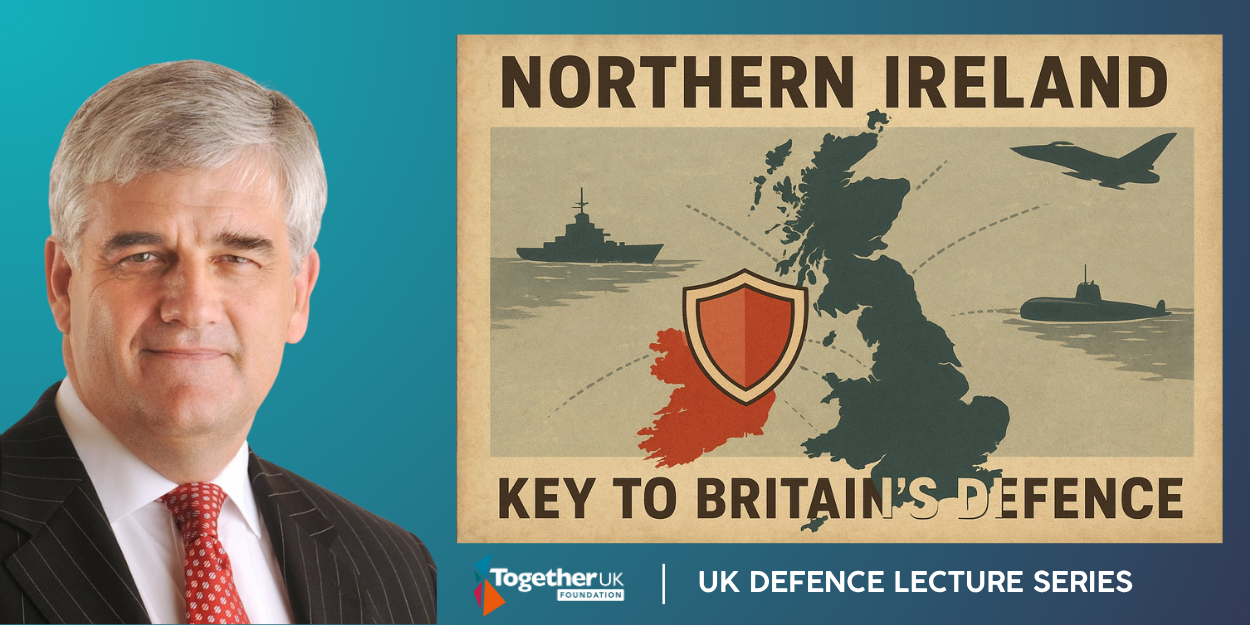
Northern Ireland is Central to Britain’s Defence
Vulnerabilities aside, the Irish Republic is strategically irrelevant as long as the UK maintains Northern Ireland says ex-Nato commander
At a Together UK Foundation lecture in the House of Lords on Wednesday 22 October 2025 we heard a stark and often-ignored consideration from Rear Admiral Chris Parry: a ‘United’ Ireland would threaten the security of Britain and the free world.
Northern Ireland’s place in the United Kingdom is not merely constitutional — it is a strategic asset for Britain’s defence.
Part of our UK Defence series, the event brought together parliamentarians, peers, academics and defence experts to consider the growing maritime and undersea threats posed by Russia and China. I want to begin by recording our gratitude to Rear Admiral Parry for delivering such a clear, uncompromising lecture — his experience as a Falklands veteran and former senior Nato commander gave the discussion real operational weight and helped frame why the Union matters in defence terms.
Key points from the briefing:
-
Strategic depth provided by Northern Ireland: Mr Parry emphasised that as long as Northern Ireland remains part of the UK, Britain retains a critical base to police approach routes from the Atlantic and the North Sea — including the North Channel between Northern Ireland and Scotland — which are vital to the deployment and security of our submarine deterrent. A change in that constitutional status, he warned, would materially weaken the UK’s ability to safeguard those approaches.
-
Undersea vulnerability: The briefing highlighted risks to undersea infrastructure in the eastern Atlantic — notably communication cables and seabed assets — and the danger posed by Russian and Chinese naval activity in waters around Ireland. Mr Parry argued that these vulnerabilities would become more acute if a united Ireland removed the UK’s foothold on the island.
-
The case for increased allied activity: Drawing on recent operational patterns, Rear Admiral Parry urged Nato and allied navies to increase presence and exercises in the wider Irish maritime zone — both to deter malign activity and to practise the freedom of navigation operations that underpin the security of the West. He said that, in strategic terms, neutrality is no longer a neutral choice; it has consequences for collective defence and resilience.
-
Co-operation over history: The Admiral made a compelling, if uncomfortable, appeal to our nearest neighbour — that historical grievances should not prevent practical military co-operation in defence of shared interests. He argued that partnership would better protect both these islands than separation.
The briefing was hosted by Lord Paul Bew and organised by us at Together UK Foundation. The constitutional ties binding the United Kingdom are not simply a matter of identity or history — they are a matter of national security. Rear Admiral Parry’s analysis underlined that Northern Ireland is integrally linked to the UK’s strategic posture, and that any debate about constitutional change should be informed by sober assessment of defence consequences.
We will continue the UK Defence series to ensure parliamentarians and the public hear from military practitioners and experts on the practical implications of constitutional choices. Our aim is to foster informed debate — grounded in security realities — about what best protects these islands and the freedoms we share.
Finally, on behalf of the Together UK Foundation, thank you again to Rear Admiral Chris Parry for joining us and for contributing so powerfully to this important discussion.
Andrew Grocock, CEO of Together UK Foundation

